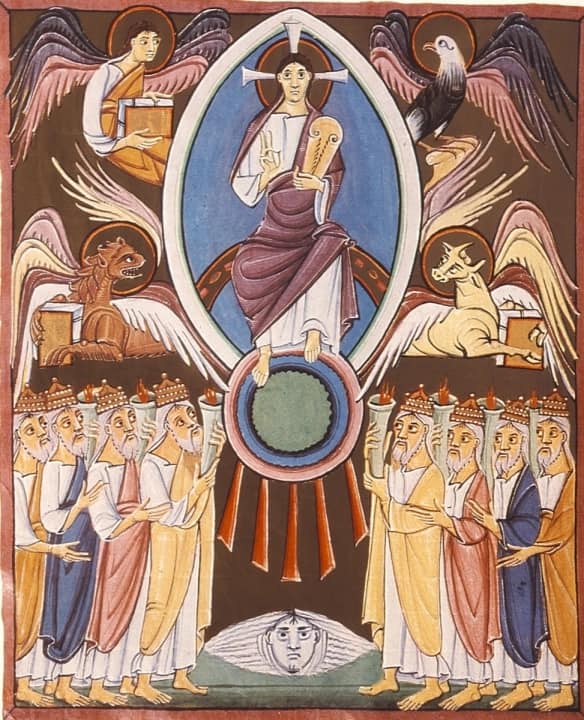 Gospel of 17 March 2021
Gospel of 17 March 2021
Wednesday of the Fourth Week of Lent
John 5:17-30
The dead will hear the voice of the Son of God, and all who hear it will live
Jesus said to the Jews, ‘My Father goes on working, and so do I.’ But that only made them even more intent on killing him, because, not content with breaking the sabbath, he spoke of God as his own Father, and so made himself God’s equal.
To this accusation Jesus replied: ‘I tell you most solemnly, the Son can do nothing by himself; he can do only what he sees the Father doing: and whatever the Father does the Son does too. For the Father loves the Son and shows him everything he does himself, and he will show him even greater things than these, works that will astonish you. Thus, as the Father raises the dead and gives them life, so the Son gives life to anyone he chooses; for the Father judges no one; he has entrusted all judgement to the Son, so that all may honour the Son as they honour the Father. Whoever refuses honour to the Son refuses honour to the Father who sent him. I tell you most solemnly, whoever listens to my words, and believes in the one who sent me, has eternal life; without being brought to judgement he has passed from death to life. I tell you most solemnly, the hour will come – in fact it is here already – when the dead will hear the voice of the Son of God, and all who hear it will live. For the Father, who is the source of life, has made the Son the source of life; and, because he is the Son of Man, has appointed him supreme judge. Do not be surprised at this, for the hour is coming when the dead will leave their graves at the sound of his voice: those who did good will rise again to life; and those who did evil, to condemnation. I can do nothing by myself; I can only judge as I am told to judge, and my judging is just, because my aim is to do not my own will, but the will of him who sent me.’
Reflexion
Today is the first of three occasions where our Lord declares that He can do nothing by Himself. Seems like an utterly humbling deflection of whatever praises people may be heaping on Him upon witnessing His miracles. But here, it is the reverse. Here it is not a humble deflection of praises but a defence of His actions against vehement attacks against His identity and ministry.
Today’s passage follows immediately after the miracle of healing the crippled man which was performed at the Pools of Bethzatha. Nothing controversial about this. But having done this on the Sabbath day, His actions immediately incurred the indignation of the Jews. Indeed, their wrath was so vicious that they sought to murder our Lord on the spot.
In the first line of defence, our Lord states that this miracle is actually attributed to God who does not cease to work on a Sabbath: “My Father goes on working, and so do I.” This should have brought immense consolation to His hearers knowing that God is never idle, that His Providence extends beyond the limitations experienced by His creatures. But it had the opposite reaction from the Jews. Instead of reflecting upon the powerful miracle that had been wrought and upon the irrefutable power of God that was made manifest in their midst, they charged our Lord with blasphemy, because Jesus “spoke of God as His own Father, and so made Himself God’s equal.”
This brought forth the first of three similar declarations: “the Son can do nothing by himself; he can do only what he sees the Father doing: and whatever the Father does the Son does too.” This does not suggest that the Son was subordinate and inferior to the Father. To claim this would be a heresy rejected very early in the Church. The statement is reinforcing this point that the Father and the Son, though clearly distinct persons, act in accord, with one mind and one heart, united in their actions. Just like a son mimics the father, Jesus mimics His Father perfectly. Mimicry would be the hallmark of that relationship, not innovation nor creativity. Likewise, we too are to observe the actions of God and His Son, and imitate their example.
Now the Lord didn’t leave the point there. He went on to say that His Father would show Him greater works than the healing they had witnessed at Bethzatha. That greater work was in resurrecting the Son and granting Him everlasting life, and by this great work, God was signalling to the Son that He wanted Him to do the same: “as the Father raises the dead and gives them life, so the Son gives life to anyone he chooses.” As the Father is the Source of Life, the Son too will become the Source of new life.
The Lord learnt everything from His Father. We must learn everything from our Master. His words and ideals and motives must now be ours. This must be our project during Lent and the entire season of our life. The Lord fully yielded up Himself to please the Father—we are asked to do the same. It will require us to abide in Christ, living with Him, as it were. We are not permitted to let our will override the Father’s. Like our Lord, we are called to always do those things that pleases Him. Surrendering our will to the will of Christ is saying that without Him, we can do nothing. May we take these principles to heart and bring forth much fruit to the honour of our heavenly Father and to the honour of His Son.
